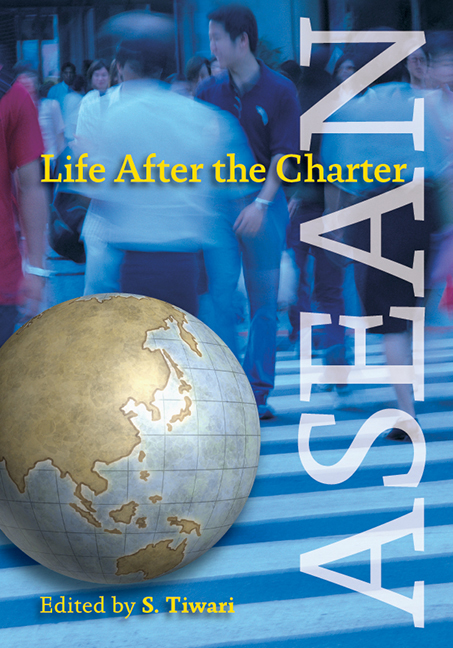Book contents
- Frontmatter
- Contents
- Foreword
- Preface
- List of Contributors
- Introduction
- 1 ASEAN Legal Personality under Its New Charter – Its Nature, Meaning and Implications: Status of the Work and Issues Involved
- 2 Does ASEAN Exist? The Association of Southeast Asian Nations as an International Legal Person
- 3 Life in ASEAN After the Entry into Force of the ASEAN Charter: Implications and Follow-ups
- 4 Translating the Design into a Bloc: The Domestic Implementation of the ASEAN Charter
- 5 ASEAN Trade in Goods Agreement (ATIGA)
- 6 The ASEAN Comprehensive Investment Agreement 2009: Its Objectives, Plans and Progress
- PRIVATE SECTOR PERSPECTIVES
- 7 The ASEAN Charter and the ASEAN Economic Community: A Watershed for Regional Economic Integration?
- 8 Implications of an Uncertain Global Economy on Integration Initiatives
- 9 Challenges to Achieving the ASEAN Economic Community
- 10 ASEAN: An Integrated Market?
- 11 A Miscellany of Trade Issues
- 12 Policy Issues for ASEAN Countries
- Index
12 - Policy Issues for ASEAN Countries
from PRIVATE SECTOR PERSPECTIVES
Published online by Cambridge University Press: 21 October 2015
- Frontmatter
- Contents
- Foreword
- Preface
- List of Contributors
- Introduction
- 1 ASEAN Legal Personality under Its New Charter – Its Nature, Meaning and Implications: Status of the Work and Issues Involved
- 2 Does ASEAN Exist? The Association of Southeast Asian Nations as an International Legal Person
- 3 Life in ASEAN After the Entry into Force of the ASEAN Charter: Implications and Follow-ups
- 4 Translating the Design into a Bloc: The Domestic Implementation of the ASEAN Charter
- 5 ASEAN Trade in Goods Agreement (ATIGA)
- 6 The ASEAN Comprehensive Investment Agreement 2009: Its Objectives, Plans and Progress
- PRIVATE SECTOR PERSPECTIVES
- 7 The ASEAN Charter and the ASEAN Economic Community: A Watershed for Regional Economic Integration?
- 8 Implications of an Uncertain Global Economy on Integration Initiatives
- 9 Challenges to Achieving the ASEAN Economic Community
- 10 ASEAN: An Integrated Market?
- 11 A Miscellany of Trade Issues
- 12 Policy Issues for ASEAN Countries
- Index
Summary
The conclusions and policy issues set out below arise from the presentations and discussions on the topics of the workshop's three sessions. They are set out here for consideration by ASEAN policymakers and officials, with the hope that they will help to improve the implementation and utilization of the Charter, the ATIGA, the ACIA and the ASEAN economic integration process.
HOW TO UTILIZE ASEAN'S LEGAL PERSONALITY?
ASEAN needs to work on and settle the question of how it wishes to utilize its legal personality. This will allow the legal personality to be used meaningfully.
NEED TO MONITOR IMPLEMENTATION OF CHARTER AND ASEAN TREATIES
Article 5(2) of the Charter requires that ASEAN countries “take all necessary measures, including the enactment of appropriate domestic legislation, to effectively implement the provisions of the Charter and to comply with all obligations of membership”. The domestic implementation of the ASEAN Charter will continue to occupy ASEAN for some time. Since more obligations will be created as ASEAN takes further steps to integrate its member states, it would be useful if ASEAN instituted regular monitoring and reporting processes. This would reduce bottlenecks in the implementation of the Charter and ASEAN treaties.
AN EXPECTATION OF CHANGE
The ASEAN Charter is intended to turn ASEAN into a rulesbased organization. The workshop felt that through its very existence the Charter had an important symbolic value. It had created an expectation that things would change. It was thus important for ASEAN members states to live up to their commitments. The implementation of ATIGA and ACIA would be important tests as to whether the ASEAN Charter has changed anything or if these remained as action plans with an emphasis on plans rather than action.
BARRIER TO INTEGRATION – INFRASTRUCTURE
It was revealed during the workshop that according to a PECC survey, the major impediments to economic integration from a Southeast Asian perspective were the domestic, behind-the-border constraints, especially infrastructure.
- Type
- Chapter
- Information
- ASEANLife after the Charter, pp. 149 - 154Publisher: ISEAS–Yusof Ishak InstitutePrint publication year: 2010

